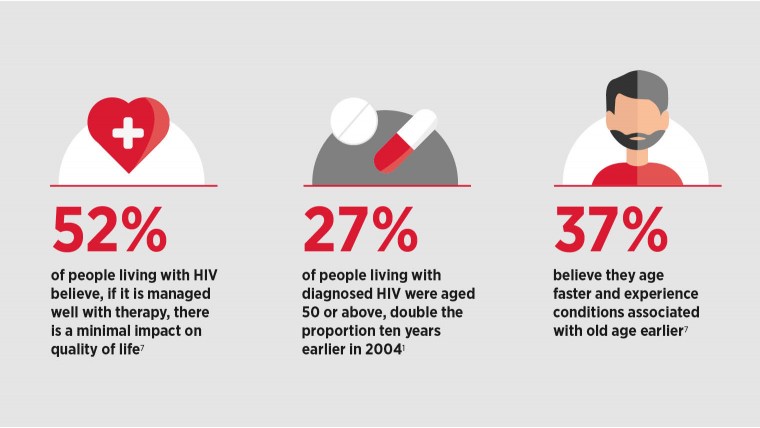It is a great achievement that advances in HIV management have enabled people living with HIV to have a life expectancy near that of the general population. However, long-term exposure to the virus and taking the medications used to treat it over such long periods can amplify and accelerate the normal ageing process.
So as they age, people living with HIV accumulate risk factors associated with long-term management and may be more likely to develop other conditions such as kidney, heart or liver disease, certain types of cancer and bone problems. This means that non-Aids-related co-morbidities such as these might start to have a greater impact than the disease itself.
A new type of care is needed to help mitigate these risks and educate the estimated 107,800 people in the UK living with HIV on how to ensure their long-term health as, by 2030, it is estimated that 84 per cent of them might be living with an age-related co-morbidity.

However, a recent survey conducted by Opinion Health among 155 people living with HIV and commissioned by Gilead Sciences, has highlighted that many patients are unaware of these co-morbidities. The survey among people living with HIV is part of the company’s advocacy initiative designed to signpost routes to enduring health. It aims to promote understanding and importance of long-term health as a way of life to help people living with HIV become fully engaged with staying healthy.
The results show that 24 per cent of those with an undetectable viral load have other health issues, including depression, osteoporosis, diabetes and hepatitis. Some 37 per cent believe their HIV status comes with added health jeopardy as they age, while 41 per cent believe they will age in much the same way as someone without HIV.
Remaining healthy and living well is a top-ten goal for 84 per cent of HIV patients, and ageing is their biggest health conce
To tackle the challenge of ageing with HIV, some experts recently called for new management strategies to manage more effectively the long-term health needs of the ageing HIV population. These include:
- An engrained multidisciplinary approach – education of non-HIV specialists and patients on the benefits of a multidisciplinary approach and enhanced communications between disciplines
- A greater personalisation of care – treatment plans must be developed around each individual living with HIV, with updates to best-practice guidelines closely monitored and incorporated into treatment plans
- Improved detection of co-morbidities – the development of new tools specific to the HIV population and comprehensive medical evaluation of patients to ensure prompt detection
- Earlier HIV diagnosis and treatment – enter people living with HIV into treatment earlier to gain the full benefit from treatment and provide physicians with the best chance of managing co-morbidities
- Lifestyle change – easier access to primary prevention services for patients, such as smoking cessation clinics, so that people with HIV are supported in reducing their long-term risk of co-morbidities.
The promising insight from the survey was the revelation of a willingness to adapt with 67 per cent of HIV patients happy to consider lifestyle changes to lead a long and fulfilling life. And, with good management of HIV and lifestyle, 52 per cent of patients believe there is minimal impact on quality of life.
Remaining healthy and living well is a top-ten goal for most HIV patients, and ageing brings health concerns.
New methods of care that proactively identify and respond to risks offer the hope of preserving health in the community. They provide the basis of a shift across the patient-health system spectrum that can improve long-term outcomes.
Defined by the regular clinical evaluation of a multidisciplinary approach with long-term views, this empowers patients to take control of their health and allows providers to design cost-effective solutions.
A new short film – My HIV… My Rules – featuring stories of ordinary people living inspirational lives with HIV was premiered in London last month. They talk about their passion for life and their goals for a bright, healthy future as they continue to live with HIV.
www.liquidproductions.co.uk/myhivmyrules

